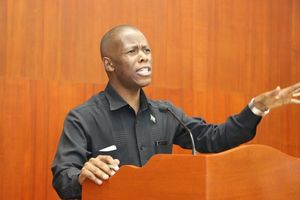‘Hakuna Matata’: The West is at it, again
There have been disturbing developments during the past two weeks with regards to how the big boys in the West treat their perceived ‘smaller’ brothers in Africa.
It has always been the case with this relationship, that it cannot be a win-win situation. No-one expects better treatment from our Western ‘big brothers’.
For example, why would anyone try to force the other into a sexual orientation that they do not believe in at all?
But as heads continue to spin over the LGBT debate, Walt Disney World has decided to patent the popular Swahili phrase ‘hakuna matata’, sparking anger and protest from various quarters.
Africa has always been a hot spot of linguistic gems, from where many people across the world borrowed vocabulary. Think of the word ‘Safari’, which is now accepted globally.
A friend sent me an email detailing this new development, and urging me to be part of the thousands of signatures that will reverse the Walt Disney World’s apparent theft of what he says is purely East African.
The Walt Disney Company first filed to trademark the famous Swahili phrase ‘Hakuna Matata’, which means “No problems” on August 8, 1994.
Disney first used the words in the animated film ‘Lion King’ when Timon and Pumba sang a song with the phrase in it.
Those against the pilferage of African culture over the years want the entire East African Community to enhance protection of words that form part of our heritage by applying for expungement of already granted trademarks that contain heritage.
The thought of it alone is scary and the question is why would this giant seek to rob East Africans of their heritage?
But this is not a lone pursuit by the West to try and take away what is purely African. As a matter of fact, this pursuit is likely to continue if nothing is done.
A couple of years ago, designer Louis Vuitton made the Maasai Shuka an integral part of his spring-summer collection.
The iconic red and purple-blue shuka worn by the East African Maasai, is an age old symbol of Maasai tradition that has been handed down through generations.
According to sources, the idea was hatched by Louis Vuitton’s men’s style director Kim Jones spent his childhood in Africa, and, according to the New York Times, started his role at the label with a mission to “embrace, via the luxury label’s travel history, the craft and culture of Africa.”
Louis Vuitton has not hidden the fact that Kim Jones’ inspiration is actually from Africa (Kenya and Tanzania), however, what still is a serious point of contention is who owns the Maasai ‘shuka’.
Though the use of traditional fabrics from other parts of the world in design collections is not a new phenomenon, this is another case of something African influencing Western trends with no obvious benefit to Africa.
The last time I had a chat with designer Kemi Kalikawe, she, too admitted that influences and ideas in a globalised world are becoming increasingly fluid, flowing.
However, as much as she made her point about borrowing a bit, the patenting bit smells quite bad.
The recent patenting and Vuitton’s efforts is nearly as bad as slavery because instead of massive cheap labour, Africa is now giving away its heritage free.
There is need to think more about the consequences of our hunger for Western validation of our ways of life, which seems to be the only correct way of life.
But even then the question that we ought to ask ourselves is for how many decades has the Maasai ‘shuka’ or the ‘Hakuna Matata’ phrase been with us without anyone thinking of its commercial value?
In reality, Louis Vuitton and Disney now own a piece of Tanzania/Kenya’s cultural heritage through its branding. As a matter of fact there are many aspects of our traditions and cultural expressions that are already in the public domain and thus cannot be patented or copyrighted because they belong to some or all Tanzanians/ East Africans.



